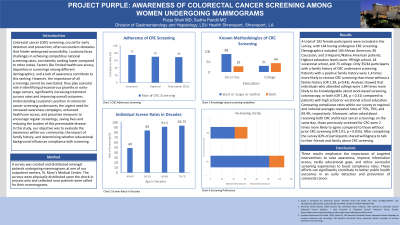Monday Poster Session
Category: Colorectal Cancer Prevention
P2133 - Project Purple: Awareness of Colorectal Cancer Screening Among Women Undergoing Mammograms
Monday, October 28, 2024
10:30 AM - 4:00 PM ET
Location: Exhibit Hall E

Has Audio
- PS
Pooja Shah, MD
Louisiana State University Health
Shreveport, LA
Presenting Author(s)
Pooja Shah, MD1, Sudha Pandit, MD2
1Louisiana State University Health, Shreveport, LA; 2LSU Health, Shreveport, LA
Introduction: Colorectal cancer (CRC) screening often encounters obstacles that hinder widespread accessibility. Louisiana faces challenges in achieving comprehensive screening rates, consistently ranking lower compared to other states. Factors like limited healthcare access and awareness and disparities in screenings among different demographics contribute to this ranking. Understanding Louisiana's position in CRC screening underscores the urgent need for increased awareness and healthcare access to reduce the burden of this preventable disease, especially in our minority female population. In this study, our objective was to evaluate the awareness of CRC screening and willingness to screen for CRC independently versus dual screening (CRC screening and mammography on the same day) among women in our community.
Methods: A survey was created and distributed among patients undergoing mammograms at one of our outpatient clinics. The surveys were physically distributed upon the check-in process only and collected once they were called for their mammograms.
Results: A total of 192 female participants were involved in the survey, with 144 participants previously undergoing CRC screening. Demographics included 104 African American, 84 Caucasian, and 3 Hispanic/Native American patients. Patients with a positive family history were 1.4 times more likely to receive CRC screening than those without a family history (OR 1.39, p=0.43). Analysis showed that individuals who attended college were 1.84 times more likely to be knowledgeable about stool-based screening, colonoscopy, or both (OR 1.84, p = 0.31) compared to patients with high school education. Comparing compliance rates within our survey to regional and national averages revealed rates of 75%, 70%, and 69.4%, respectively. Moreover, when asked about receiving dual screening, those previously screened for CRC were 2 times more likely to agree (OR 2.01, p = 0.035).
Discussion: These results emphasize the importance of targeted interventions, like dual screenings and campaigns, to raise awareness and minimize educational gaps. The aim of these targeted interventions would be to utilize successful screening experiences to boost compliance rates with health care screenings for women and limit administrative cost burdens. These efforts can significantly contribute to better public health outcomes for early detection and prevention of colorectal cancer.
Disclosures:
Pooja Shah, MD1, Sudha Pandit, MD2. P2133 - Project Purple: Awareness of Colorectal Cancer Screening Among Women Undergoing Mammograms, ACG 2024 Annual Scientific Meeting Abstracts. Philadelphia, PA: American College of Gastroenterology.
1Louisiana State University Health, Shreveport, LA; 2LSU Health, Shreveport, LA
Introduction: Colorectal cancer (CRC) screening often encounters obstacles that hinder widespread accessibility. Louisiana faces challenges in achieving comprehensive screening rates, consistently ranking lower compared to other states. Factors like limited healthcare access and awareness and disparities in screenings among different demographics contribute to this ranking. Understanding Louisiana's position in CRC screening underscores the urgent need for increased awareness and healthcare access to reduce the burden of this preventable disease, especially in our minority female population. In this study, our objective was to evaluate the awareness of CRC screening and willingness to screen for CRC independently versus dual screening (CRC screening and mammography on the same day) among women in our community.
Methods: A survey was created and distributed among patients undergoing mammograms at one of our outpatient clinics. The surveys were physically distributed upon the check-in process only and collected once they were called for their mammograms.
Results: A total of 192 female participants were involved in the survey, with 144 participants previously undergoing CRC screening. Demographics included 104 African American, 84 Caucasian, and 3 Hispanic/Native American patients. Patients with a positive family history were 1.4 times more likely to receive CRC screening than those without a family history (OR 1.39, p=0.43). Analysis showed that individuals who attended college were 1.84 times more likely to be knowledgeable about stool-based screening, colonoscopy, or both (OR 1.84, p = 0.31) compared to patients with high school education. Comparing compliance rates within our survey to regional and national averages revealed rates of 75%, 70%, and 69.4%, respectively. Moreover, when asked about receiving dual screening, those previously screened for CRC were 2 times more likely to agree (OR 2.01, p = 0.035).
Discussion: These results emphasize the importance of targeted interventions, like dual screenings and campaigns, to raise awareness and minimize educational gaps. The aim of these targeted interventions would be to utilize successful screening experiences to boost compliance rates with health care screenings for women and limit administrative cost burdens. These efforts can significantly contribute to better public health outcomes for early detection and prevention of colorectal cancer.
Disclosures:
Pooja Shah indicated no relevant financial relationships.
Sudha Pandit indicated no relevant financial relationships.
Pooja Shah, MD1, Sudha Pandit, MD2. P2133 - Project Purple: Awareness of Colorectal Cancer Screening Among Women Undergoing Mammograms, ACG 2024 Annual Scientific Meeting Abstracts. Philadelphia, PA: American College of Gastroenterology.
